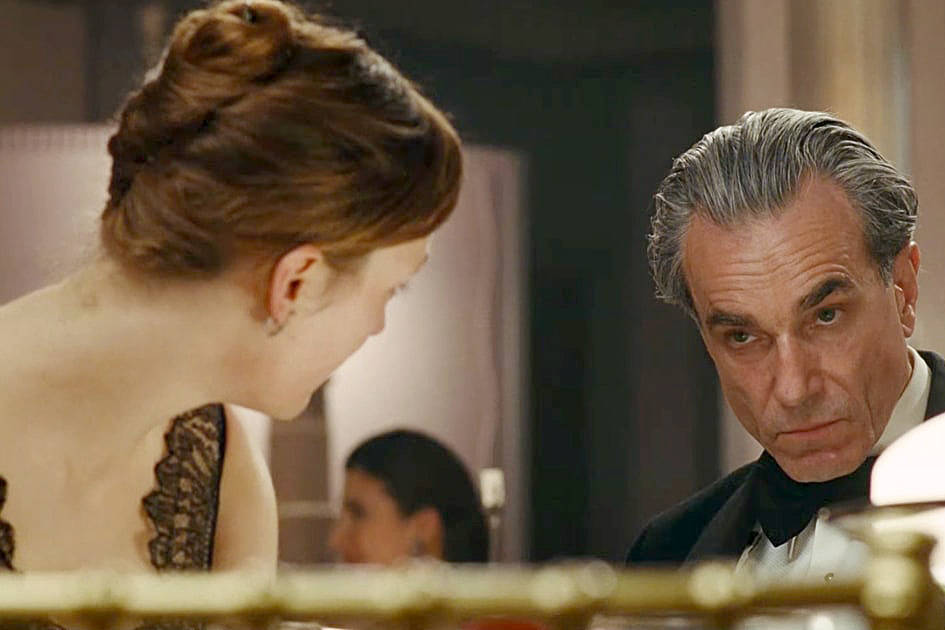The main character in Phantom Thread is a 1950s fashion designer named Reynolds Woodcock, a meticulous craftsman and a godlike giant of his industry. Early in the film he prepares for the day’s work, and you know he’s enacting the same rituals he does every morning: the careful brushing of hair, the measured buttering of toast. It’s a terrific introduction to a character, but I suspect writer-director Paul Thomas Anderson is also paying tribute to his leading man. The actor we’re watching is Daniel Day-Lewis, the three-time Oscar winner who previously worked with Anderson on There Will Be Blood. Godlike in his own profession, Day-Lewis is famous for his pickiness and obsessive research. Woodcock’s fussiness must be partly a portrayal of this remarkable and very controlled actor.
If Phantom Thread is an excellent portrait of an artist, it is not a predictable or conventional one. The outline sounds easy enough to figure out: uptight Woodcock, a serial monogamist whose devotion to work precludes the idea of settling down with any one woman, is finally landed by an unvarnished waitress named Alma (Vicky Krieps). The movies are full of stories about difficult men who just need a little home cookin’ and plain talk to melt their hearts and domesticate them, so it doesn’t surprise us when Woodcock falls for Alma. But what follows is not remotely conventional. There’s a sinister undercurrent that has led some critics to notice a similarity to Hitchcock’s Rebecca, another story of a young woman drawn into a rigidly-ordered household. True, but Phantom Thread moves well beyond that reference, into much more mysterious territory.
Given Anderson’s recent films, “mysterious territory” might not sound like a recommendation. The baffling final hour of The Master and the generally muddled Inherent Vice suggested that Anderson’s glittering talent was in danger of swallowing its own tail. But Phantom Thread, though sometimes a puzzle, blooms with possibilities the longer it goes on. Halfway through, it steers in the direction of something really, really dark, but comes to a wonderfully perverse conclusion that might qualify as the year’s strangest happy ending—not by denying the stranger impulses of humankind, but by suggesting that people sometimes fill each other’s empty places in curious, oddly useful ways.
That’s as specific as I can get without spoilers—try to avoid them if you can. I knew nothing about this movie when I saw it, and I found its 130 minutes spellbinding and mind-bending (aided in no small measure by Jonny Greenwood’s lush music). Phantom Thread has commanding scenes of drama, but it’s also laced with humor. The two leads are adept at supplying both, and so is Lesley Manville, as Woodcock’s sister, a hawk-eyed manager of her brother’s business and life. Luxembourgian actress Krieps is terrific, all the more so because most of us won’t have seen her in film before—it’s possible to read Alma as a breath of fresh air but also wonder whether there isn’t something a bit off about her. Those three are just about the whole show: the film has very little period detail or extraneous material. Everything is sewn together without waste.
Day-Lewis is elegant and vaguely terrifying; a master of voices, he gives Woodcock a carefully-cultivated speaking tone that’s as neat and tucked-in as a trouser pleat. If, as he has threatened, this is the actor’s final film, he picked a glorious way to bow out. Never exactly a natural presence in front of a camera, Day-Lewis is one of those actors who rely on technique and hard work to achieve his aims. He’s tightly wound and so is Woodcock, a parallel that leads to one of the funniest moments Day-Lewis has had on screen: A wealthy patron wears one of his dresses to her wedding and drunkenly makes a spectacle of herself, leading Woodcock to demand the return of his gown, on the spot. When a wedding attendant asserts that the dress can’t be handed over because the bride is in a back room asleep, Woodcock recoils: “In the dress?” The idea that one of his handmade creations is being crushed and creased by comatose human flesh is beyond revolting, and Day-Lewis’s horror is palpable. This isn’t sloppiness. It’s a crime against art.
Opens Fri. Jan. 11 at the Egyptian theater, rated R






